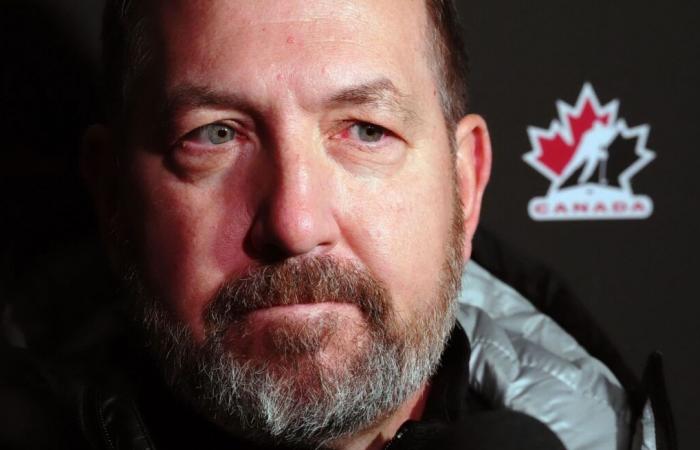
Scott Salmond and other Hockey Canada executives sat in front of images of the National Capital Region’s sights.
What they saw over the previous week in Ottawa was less rosy.
Canada was eliminated from the World Junior Hockey Championship following a 4-3 loss to the Czech Republic in the quarterfinals. The team had been ousted by the same team at the same stage of the tournament 12 months earlier.
Salmond, vice-president of high performance and hockey operations, as well as CEO Peter Anholt and head scout Al Murray touted a talented and competitive group before the tournament.
What the Canadiens saw over five games looked more like a dysfunctional group, one that struggled to score and lacked discipline.
“Who is to blame? You can blame me, Salmond said Friday at a news conference at a downtown Ottawa hotel. If you think it’s the recruiters’ fault, I hire the recruiters. If you think it’s because of the head coach, I’m hiring the head coach. Do you want to blame someone? Blame me. »
“In this country you have to win more often than you lose,” he added. We expect that. »
Some observers were concerned that Hockey Canada had preferred to invite players perceived as more complete over talented offensive players.
“Talented players, but hard working,” Murray said. I don’t think we lack talent. We didn’t score enough at times, but that’s a collective aspect. I don’t know how to explain it. »
Anholt said inviting the best players available and asking them to adjust their roles was not the right formula, despite Hockey Canada’s success at different levels when they used that formula.
“You also have to look at the personality of the player, how he plays, how he works,” Anholt said.
Anholt said he wouldn’t change anything about this year’s field, even though Canada finished in fifth place for a second year in a row — the first for Canada since the early 1980s.
“We were counting on a group of hard-working players,” he said. He simply didn’t deliver the goods. »
A stunning 3-2 shootout loss to Latvia in the preliminary round was a big blow to the group, Salmond said.
“I think it affected the group,” he said. I felt a little difference. »
Canada, which lost the services of defenseman Matthew Schaefer early in the tournament, also suffered a 4-1 loss to the United States during the preliminary round. This set the table for a dangerous duel against the Czech Republic by virtue of Canada’s third place in Group A.
“This tournament is important to many Canadians,” Salmond said. Many people had things to say, to write. It shows how much they care about this tournament. »
Head coach Dave Cameron was criticized throughout the tournament, but Hockey Canada didn’t want to point the finger at him.
“We had an identity, a way we wanted to play,” Salmond said. [Cameron] does not score a goal. His job is to put his players in a good position to do so. I think that’s what he did. »
The Maple Leaf was limited to 13 goals in five games – just two more than Kazakhstan – on the strength of a shooting percentage of just 6.34 percent, the lowest of the tournament. It was also the most penalized team with 27 shorthanded sequences.
“It’s a fatal combination,” Anholt summed up.
Salmond was asked if there should be any changes within Hockey Canada.
“Our program has demonstrated that it is capable of success,” he recalled. We have proven that we do good things, with good people. It won’t change. I don’t believe that the results always reflect the work of the people in place or the process. »
“In sport, sometimes you win, sometimes you lose,” concluded Salmond.





